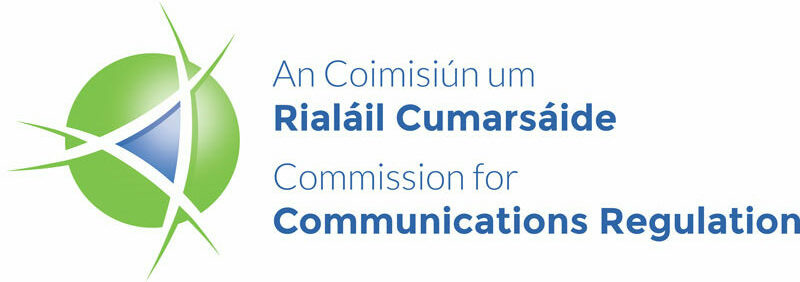ComReg’s Robert Mourik: Prepared to regulate the evolving electronic communications sector

Ahead of the 25th anniversary of the liberalisation of the telecoms sector, Robert Mourik, Commissioner and Chairperson of the Commission for Communications Regulation (ComReg) discusses connectivity, effective competition, consumer protection, and the legislative landscape, as well as his organisation’s trajectory.
Covid has simultaneously catalysed digitalisation and redefined the concept of connectivity. “The transition from a ‘nice to have’ to an indispensable utility has been rapid,” Mourik observes, adding: “We always knew that we were moving towards a world in which people are increasingly connected and that this connectivity could be increasingly leveraged. That trend preceded the onset of the pandemic, but the Covid crisis has accelerated it.
“It is now very common to attend a remote meeting and it is normal to transcend geographic boundaries to meet virtually with colleagues in real-time. It is a cultural shift as much as a technological shift and while we are seeking to establish an optimal balance, people have realised the significant role that electronic communications play in their lives. Simultaneously, Ireland has experienced significant improvement in relation to the European Commission’s Digital Economy and Society Index (DESI) which tracks EU member states’ digital progress. Ranking fifth in the Commission’s assessment of all 27 EU member states in 2022, Ireland is now among the top countries in Europe.
Investment
Amid significant national investment in the telecoms sector, including the ongoing rollout of the National Broadband Plan, Ireland is pivoting away from Eir’s copper network towards a new fibre network. “Given the levels of investment,” the ComReg chairperson projects, “In five or six years’ time, Ireland will be one of the first countries to achieve full fibre coverage.”
While he acknowledges that capital markets are in relatively good shape and seeking investment vehicles, he indicates that it is not always easy for market actors to invest significant amounts of money.
“Within the ecosystem, we are observing that some telecoms companies are being squeezed in the middle. Profits are now being made by Apple and Samsung in the manufacture and sale of handsets or by Google and Meta in providing services.
“During the Covid crisis, we have observed how crucial these networks are in supporting both our society and economy. In general, the Irish operators have performed well in maintaining their networks and providing sufficient headroom that allows for the absorption of extra traffic. Without them, we would not have been able to operate during the pandemic to the extent that we have,” Mourik reflects.
“ComReg itself played a significant role here by providing a series of temporary licences during the Covid pandemic. We gave each of the three mobile network operators access to valuable 700 MHz spectrum for the last two-and-a-half years to ensure that networks had sufficient capacity to meet demand during Covid.”
Consumer perspective
In September 2022, ComReg facilitated a stakeholder engagement forum with the telecoms operators which explored the poor consumer perception of the telecoms sector. “One conclusion that we drew is that people regard the services that are provided via the internet as critically important. Indeed, connectivity has become a basic service. It is not a ‘nice to have’, rather it is an essential service to support all our work, family, and social lives.
“As such, consumers have certain expectations of the services provided. The bar that companies must meet in the eyes of the consumer is relatively high. Therefore, while significant investment is being undertaken, the telecoms companies should not lose sight of the fact that customer services must be easy to contact and of high quality. This is very important,” Mourik emphasises.
Mourik cites the example of the installation of a new broadband line at a domestic or commercial location. “Telecommunications is a technically complex sector and such an installation requires coordination across several layers of engineering. From a customer perspective, the expectation is for this process to be seamless. However, with several moving parts, the difficulty of achieving this should not be underestimated. While very difficult to achieve, the closer that operators can get to this objective, the better their reputation,” he says.
Effective competition
Successive governments – in conjunction with the EU – have created the legislative landscape within which ComReg operates and competition is the tool utilised to improve quality and choice in the sector. The regulator is responsible for assessing the effective competitiveness of certain electronic communications markets. When established in 2002, ComReg was tasked with regulating 18 recommended core electronic communications markets as defined by Europe. Today, however, that original number of 18 has been reduced substantially.
“It feels like we have come full circle and we have a lot to acknowledge in a sense,” Mourik begins, continuing: “ComReg has overseen that migration away from a monopoly sector where Telecom Éireann was the only provider to a sector which has a healthy degree of competition. I am very encouraged by that journey and where we are now.”
ComReg plays an important role in regulating particular wholesale prices in the market. “This is very much informed by a kind of ‘Goldilocks Principle’ – of getting it just right – whereby we want to drive down prices to a level that is conducive to competition, without driving them so far down that organisations no longer have money to invest, or that customer service and quality suffer,” Mourik explains.
In doing so, ComReg often attracts criticism from two angles, with one party suggesting that prices are too low and the other asserting that prices are too high.
“ComReg is prepared for the challenges ahead in the constantly evolving electronic communications sector.”
Robert Mourik, Commissioner and Chairperson, ComReg
Legislative landscape
Currently, the legislative landscape for communications is evolving. Across the EU, the European Electronic Communications Code (EECC) is updating and consolidating the legislative framework which informs the regulatory regime for electronic communications. The EECC will be transposed in Ireland via the Communications Regulation Bill 2022 and the European Communities (Electronic Communications) Regulations 2022.
Introduced to Dáil Éireann in September 2022, the Communications Regulation Bill 2022 was debated at second stage in the Dáil in early October. Aligning with the June 2020 Programme for Government commitment to “give the Commission for Communications Regulation greater powers of enforcement, with a particular focus on improving competition, innovation and customer service within the communications sector”, when enacted, the Bill is intended to provide ComReg with additional legal powers to further regulate the telecommunications industry.
“In some ways, it will maintain our current trajectory, but in our role consumer protection role, we will receive support tools which will be used to ensure that consumers are treated fairly,” Mourik comments.
Digital
Unlike telecommunications, digital is not a defined sector. In his role as Chair of the Economic Regulators’ Network – an association of Irish regulators – which includes the Central Bank, the Competition and Consumer Protection Commission, and the Broadcasting Authority of Ireland, Mourik is cognisant of the need to collaborate on digital.
“The world is changing and there are many more digital services which have reached sufficient maturity for the Government and the EU to consider regulating and, in some scenarios, ComReg will be expected to undertake that regulation. Very often, a problem cannot be resolved by a single entity and while one must take the lead, intense cooperation is required.
“Several regulators who are particularly impacted are beginning to coalesce and examine international best practice to advise the Government. I hope that we will achieve a better understanding of how to mitigate some of the emerging challenges that we are observing in digital services,” he says.
In this context, ComReg faces a talent management challenge. With many specialists in its ranks, including economists, lawyers, and accountancy experts, it must now consider hiring a new skillset that can respond to digital services challenges in the future.
“ComReg is prepared for the challenges ahead in the constantly evolving electronic communications sector. This new legislation transposing the European Electronic Communications Code will ensure that the telecoms regulatory framework in Ireland is fit for purpose as we move forward. The new powers under this legislation will bring benefits for consumers, businesses and ultimately for the economy and society, as a whole.”
W: www.comreg.ie






